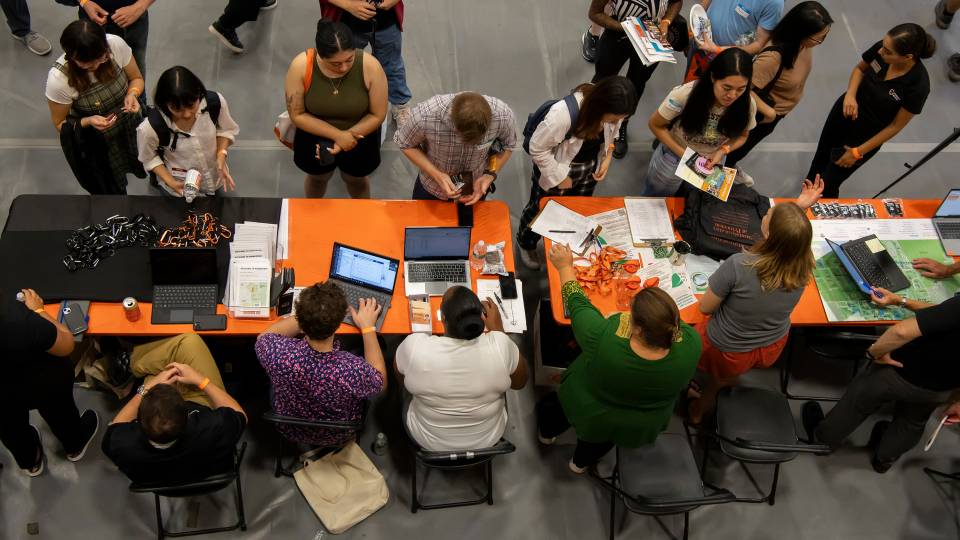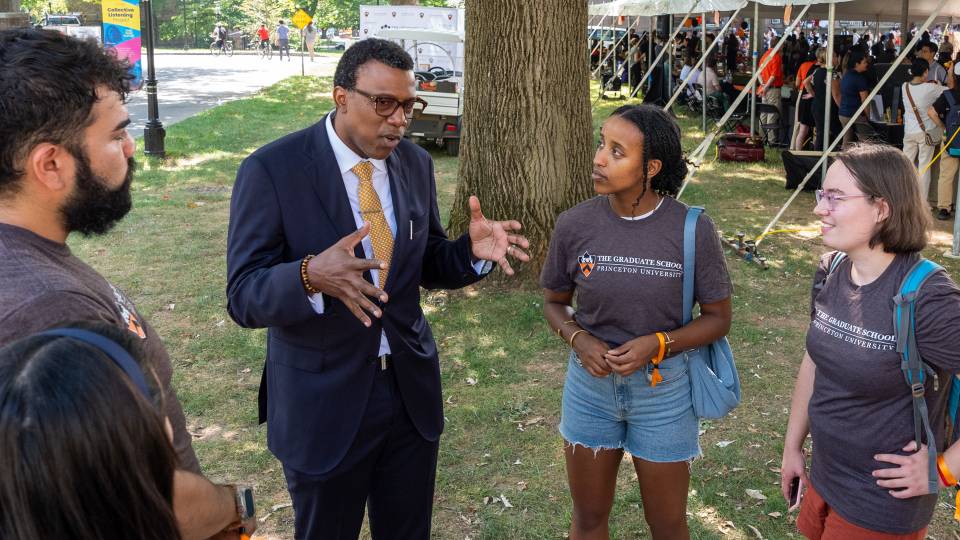Princeton faculty and students impart wisdom about graduate study to incoming students at Princeton’s Graduate School orientation. From left to right, Rodney Priestley, associate professor of chemical and biological engineering; Erika Milam, professor of history; Gabriel Moore, a student in molecular biology; Mai Nguyen, a student in psychology and president of the Graduate Student Government; and Leyla Mocan, a student in the Woodrow Wilson School of Public and International Affairs.
Emphasizing the many academic and social resources available to its students, Princeton University welcomed 670 graduate students from 47 countries to a new academic year during orientation activities Sept. 9-10.
In a keynote address on Monday, Sept. 10, in Richardson Auditorium in Alexander Hall, Princeton President Christopher L. Eisgruber(Link is external) called this year’s cohort “part of an extraordinarily impressive, diverse and cosmopolitan group of students.”

Princeton President Christoper L. Eisgruber delivers the keynote address in Richardson Auditorium in Alexander Hall.
“All of us on the faculty, I, my colleagues in the administration, recognize that graduate students are talented teachers and critical scholarly partners to our faculty in conducting pathbreaking research, and that graduate alumni are leaders in their fields making extraordinary contributions across the disciplinary landscape and in fields both inside and outside of academia,” Eisgruber said. “We have to sustain and enhance our stellar graduate programs in order to fulfill this University’s commitment to make a difference in our society for the better.”
During orientation, students gleaned information about living in Princeton from their peers, took guided walking tours around campus and dined together at Procter Dining Hall in the Old Graduate College.
Prior to Eisgruber’s remarks, Dean of the Graduate School(Link is external) Sarah-Jane Leslie(Link is external), who earned her Ph.D. from Princeton in 2007, impressed upon students that not only do they have the inner resources to succeed at Princeton, but that the Graduate School’s work is to undergird that success.
“The core of graduate education is for us to support you and enable you to actually create new knowledge,” she said. “You’re trying to discover things that have never been discovered before. You’re here with a goal of thinking thoughts no one has ever thought before. That’s an amazing thing. ... We take very seriously our commitment to enable each and every one of you to succeed in graduate school at Princeton, to participate in that process of creating new knowledge.”
Cole Crittenden(Link is external), deputy dean; Mary Bechler(Link is external), senior associate dean; Renita Miller(Link is external), associate dean of access, diversity and inclusion; and Lisa Schreyer(Link is external), associate dean for student life, detailed the funding, professional, health and social services available to students. They also offered practical advice.
“Princeton is a wonderful place to grow intellectually,” said Crittenden, a 2005 graduate alumnus. “The academic resources here are incredible. Remember to feel grateful for this rare privilege of being able to devote yourself to the life of the mind.”
Schreyer encouraged students to take advantage of opportunities beyond their academic departments — and to create new opportunities based on their own interests.

Dean of the Graduate School Sarah-Jane Leslie, who received her Ph.D. from Princeton in 2007, talks about her own experiences as a graduate student in philosophy.
Students heard from faculty and returning students in the panel Success in Graduate School, which addressed topics including building relationships, facing self-doubt, balancing work and life, and ensuring physical and mental well-being. The panelists were graduate students Gabriel Moore in molecular biology(Link is external), Leyla Mocan in the Woodrow Wilson School of Public and International Affairs(Link is external), Mai Nguyen in psychology(Link is external) and president of the Graduate Student Government(Link is external), along with faculty members Erika Milam(Link is external), professor of history(Link is external), and Rodney Priestley, associate professor of chemical and biological engineering.
“One of the things that I think is really important is to reach out to students in your program who are a few years ahead of you,” Mocan suggested. “Ask them what courses to take or which dry cleaner to go to.”
Recognizing the many stresses of graduate student life, Nguyen had two pieces of advice. “First is, be kind to yourself, and the second is, if you can, be kind to the people around you,” she said.
Moore boiled down his words of wisdom to two: “Do you,” he said. “You really are the pilot of your own graduate education.”
He also encouraged his fellow students to remember to “get out,” both to meet others and to maintain balance.
“In order to engage in this level of research and writing, you will have to discover what kinds of work and life patterns best allow you to succeed,” Milam said. “Part of what you’re going to figure out — especially in this first year — is how you work best, when you are most creative, what do you do when you feel most completely drained.”
Priestley said the best way not to fall behind in graduate studies is to stay ahead, especially when it comes to the selection of a dissertation topic and adviser. “You want to get off to a quick start,” he said. “You don’t want to be in a position in your fourth and fifth year of graduate school where you’re in an uphill battle.”
Catherine Carsley, president of the Association of Princeton Graduate Alumni(Link is external) and a 1993 graduate alumna, shared her “Top 10” list of things to do while attending Princeton, including walking to the top of Cleveland Tower and learning the lyrics to “Old Nassau,” the University’s alma mater.
Afterward the a capella group Katzenjammers led students in their first rendition of “Old Nassau.”
Earlier on Monday, students attended an information fair and lunch in Dillon Gym.

New graduate students sign up for a variety of organizations and learn about campus resources at dozens of tables lining the gym.
Joe Eichenhofer, a master’s degree candidate in computer science(Link is external), walked the gym’s perimeter stopping at the information tables and signing up to receive emails from as many organizations as he could. “I’m trying to figure out how I can be involved in interesting things outside of teaching and research and classes,” he said.
“A lot of this is really good because we’re learning about the unwritten things they don’t tell you about in graduate school,” said Christopher Lawrence, a doctoral student in ecology and evolutionary biology(Link is external), about the orientation panels. “Usually these things aren’t talked about in your department.”
Christine Cai, who is pursuing an Ph.D. in economics(Link is external), said she was grateful for the opportunity to get acquainted with Princeton’s academic culture, which is different than in her home country of France. “I didn’t know how to approach professors here,” she said. “In France, it’s very vertical, very hierarchical. You can’t call your professor by their first name.”
Students were happy to get their bearings on campus and to start to feel a part of the campus community. “Everyone is really kind to me and answering my questions,” said Zahra Bajalan, a Ph.D. student in civil and environmental engineering. “This is a good place.”

Students gather for lunch and an information fair in Dillon Gym.

The Princeton Tiger joins the festivities.







